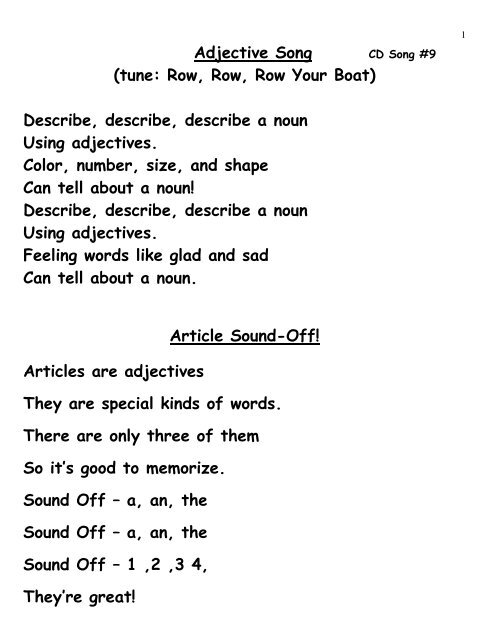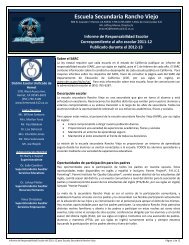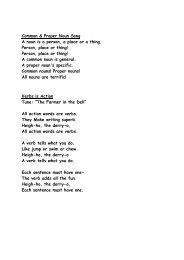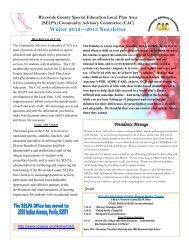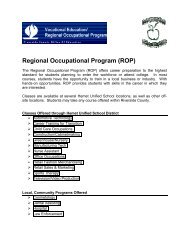Adjective Song CD Song #9 (tune: Row, Row, Row Your Boat ...
Adjective Song CD Song #9 (tune: Row, Row, Row Your Boat ...
Adjective Song CD Song #9 (tune: Row, Row, Row Your Boat ...
Create successful ePaper yourself
Turn your PDF publications into a flip-book with our unique Google optimized e-Paper software.
<strong>Adjective</strong> <strong>Song</strong> <strong>CD</strong> <strong>Song</strong> <strong>#9</strong><br />
(<strong>tune</strong>: <strong>Row</strong>, <strong>Row</strong>, <strong>Row</strong> <strong>Your</strong> <strong>Boat</strong>)<br />
Describe, describe, describe a noun<br />
Using adjectives.<br />
Color, number, size, and shape<br />
Can tell about a noun!<br />
Describe, describe, describe a noun<br />
Using adjectives.<br />
Feeling words like glad and sad<br />
Can tell about a noun.<br />
Articles are adjectives<br />
Article Sound-Off!<br />
They are special kinds of words.<br />
There are only three of them<br />
So it’s good to memorize.<br />
Sound Off – a, an, the<br />
Sound Off – a, an, the<br />
Sound Off – 1 ,2 ,3 4,<br />
They’re great!<br />
1
Unit 4:1<br />
Directions:<br />
1. Students play in pairs to try and move all three of their game pieces into their<br />
opponent’s home base on the gameboard first.<br />
2. Players start out by putting three game pieces in their own home base on the<br />
board.<br />
3. Players take turns moving one piece at a time into a free box, reading aloud a<br />
sentence in the box they land on, and choosing an adjective that completes the<br />
sentence.<br />
4. The other player checks the answer key to see if they are correct. If they are<br />
wrong, they must move their piece back to their own home base. If they are<br />
correct, they can leave their piece in the box and proceed to a touching box at<br />
their next turn.<br />
5. Players continue taking turns until one player moves all three of their game<br />
pieces into the other’s home base.<br />
2
HOMEBASE<br />
1. The ____ bat and the<br />
_____ whale are<br />
mammals.<br />
black crisp blue<br />
4. ______ giraffes and<br />
_____ monkeys have<br />
fur.<br />
living short tall<br />
7. ______ peacocks and<br />
_____ owls live in<br />
forests.<br />
brown blue sad<br />
10. I saw ___ bears in<br />
the forest last year.<br />
ugly two a<br />
2. ____ elephants and the<br />
____ rats are mammals, too.<br />
little candy big<br />
5. What mammals have<br />
_____ fur?<br />
large brown crazy<br />
8. _____ frogs live in<br />
forests that are near water.<br />
desk green scary<br />
11. Diamond is __ ______<br />
material.<br />
skinny hard a<br />
3. All mammals have<br />
____ fur.<br />
five thick kind<br />
6. _____ creatures live<br />
in the forest.<br />
thick sick many<br />
9. Sometimes, __ ____<br />
rabbit can be found<br />
hopping in the forest.<br />
white a slimy<br />
12. There is __ ____<br />
dinosaur bone at the<br />
museum.<br />
huge soft a<br />
3<br />
HOMEBASE
The Contraction Round <strong>CD</strong> <strong>Song</strong> <strong>#9</strong><br />
(to the <strong>tune</strong> of <strong>Row</strong>, <strong>Row</strong>, <strong>Row</strong> <strong>Your</strong> <strong>Boat</strong> )<br />
Con-trac-tions are fun!<br />
We use them every day!<br />
Just listen as you squash<br />
Two words;<br />
Then take letters away!<br />
DID NOT<br />
DIDN'T I squashed<br />
The O right out!<br />
It didn't die or even cry!<br />
So I don't have to pout!<br />
SHE WOULD,<br />
Becomes SHE'D.<br />
I squashed four letters out!<br />
They didn't die<br />
Or even cry!<br />
So I don't have to pout!<br />
5
Contraction Game:<br />
“I Have…Who Has…?”<br />
Directions:<br />
1. Play this game as a whole class. Pass out the 16 cards, teaming up 8<br />
students into pairs (sharing a card). *You could team up a lower &<br />
stronger reader or a native speaker with a non-English speaker.<br />
2. Ask students to read the outside of their card (“I have…” side) and<br />
then open up their card and read the inside (“Who has…?” side)<br />
before beginning the game. Ask students if anyone needs help with<br />
a word and provide assistance before the game starts.<br />
3. To begin the game, ask which student has the words “is not” on the<br />
front of their card. (You may even want to write those words on<br />
the board).<br />
4. Whoever has the card you called out begins my reading “I have is<br />
not. Who has are not?” Then the student who has aren’t would read<br />
and continue the game.<br />
5. The game is over when it gets back to the beginning student.<br />
6. After practicing a couple of times whole class, you may want to add<br />
a challenge by timing the class to see if they can “beat their time”.<br />
The cards can also be traded after every round and the students<br />
who had to share a card last time could get their own card the<br />
next time.<br />
(The game cards are in a separate document)<br />
6
Directions:<br />
1. Students play in pairs or small groups.<br />
2. Students cut out the cards below and turn them<br />
facedown.<br />
3. Players take turns flipping over two cards at a time,<br />
reading them aloud, and seeing if the present sentence<br />
and past tense of the sentence match.<br />
4. If they match, the player takes the matching pair,<br />
tells the other player(s) the underlined words on both<br />
cards, and then puts it in their pile.<br />
5. If they do not match, they return them to their spot<br />
and the other player takes their turn.<br />
6. Players keep taking turns until all the cards have<br />
been taken and whoever has the most pairs is the<br />
winner.<br />
7
Louis Braille was a<br />
teacher.<br />
He was blind at the age<br />
of three.<br />
In school, he could not<br />
read or write.<br />
Then, he was sent to<br />
school in Paris.<br />
Once I was riding a<br />
horse in a desert.<br />
Louis Braille is a<br />
teacher.<br />
He is blind.<br />
Unit 4:3<br />
Unit 4:3<br />
He can not read or<br />
write.<br />
He is going to school in<br />
Paris.<br />
I am riding a horse in a<br />
desert.<br />
8
My horse was running<br />
very fast.<br />
We were trying to<br />
reach a town.<br />
The town was very far<br />
away.<br />
The people there were<br />
very friendly.<br />
Who is going to lunch at<br />
noon?<br />
My horse is running<br />
very fast.<br />
We are trying to reach<br />
a town.<br />
The town is very far<br />
away.<br />
The people here are<br />
very friendly.<br />
Who went to lunch at<br />
noon?<br />
9
The scientists were<br />
digging for bones.<br />
The scientists are<br />
digging for bones.<br />
Spelling Rules for Plurals <strong>CD</strong> <strong>Song</strong> #7<br />
(<strong>tune</strong>: Addams Family)<br />
Singular means one. (snap, snap)<br />
Make a plural by adding "s". (snap, snap)<br />
But there's another rule - we must learn<br />
To spell the rest. (snap, snap)<br />
Look at the end for "x"<br />
or "s", "s-h" or "c-h",<br />
So we've heard we need to<br />
add the suffix "e-s"<br />
To the word. (snap, snap)<br />
And then with words (snap, snap)<br />
like mouse and mice, (snap, snap)<br />
We change the word - to make them plural.<br />
That is the rule. (snap, snap)<br />
10
Unit 4:4<br />
Directions:<br />
Cut out the two heading cards and sentence strips below ahead of time. Pass<br />
the sentence strips out to students or put them facedown in front of small group<br />
relay lines. Have students take turns flipping over a card, reading the sentence,<br />
and identifying if the underline d noun is “singular” or “plural”. Students can then<br />
walk up or run (if it is a relay) to the front and put their strip under the correct<br />
heading cards.<br />
Extensions:<br />
-Have students sort the cards into a pocket chart under the correct heading<br />
during Workshop. Then when everyone has tried it, glue the sort on chart paper<br />
for a classroom display.<br />
11
PLURAL<br />
SINGULAR<br />
Some parts of the<br />
world are always hot.<br />
Unit 4:4<br />
12
At the equator,<br />
climates are hot and<br />
rainy.<br />
The woodsman used an<br />
ax to chop the tree.<br />
The woodsman bought<br />
many axes for the job.<br />
I see one rocket up in<br />
the sky.<br />
13
A group of rockets<br />
blasted into the clouds.<br />
One man only needs one<br />
hat.<br />
Bartholomew Cubbins<br />
had 500 hats.<br />
The tallest man is not<br />
as tall as a dinosaur.<br />
14
The men in black were<br />
looking for aliens.<br />
I looked up into the<br />
sky and saw the clouds.<br />
One-fifth of the Earth is<br />
covered with deserts.<br />
Deserts have only a few<br />
plants and animals.<br />
There is not much rain<br />
in the desert.<br />
15
There are a lot of sand<br />
dunes in the desert.<br />
Camels and snakes can<br />
live in deserts too.<br />
Scientists use little<br />
brushes to dust fossils.<br />
A box of fossils were<br />
found in the museum.<br />
We love all the fossil<br />
stories in Open Court!<br />
16
What is your favorite<br />
story about fossils?<br />
I need lots of boxes to<br />
hold all these fossils.<br />
I found one brush that<br />
works well.<br />
Unit 4:4<br />
17
You Are My Adverb <strong>CD</strong> <strong>Song</strong> #10<br />
(<strong>tune</strong> of “You Are My Sunshine”)<br />
You are my adverb!<br />
You tell about verbs.<br />
You tell folks<br />
HOW,WHERE, and WHEN.<br />
You’re easily spotted<br />
By your LY, Dear.<br />
I’ll never TALK<br />
Without you again.<br />
You are my adverb!<br />
You tell about verbs.<br />
You tell folks<br />
HOW, WHERE, and WHEN.<br />
You’re easily spotted<br />
By your LY, Dear.<br />
I’ll never WRITE<br />
Without you again.<br />
18
START<br />
1<br />
<strong>Your</strong> muscles let<br />
you move easily.<br />
12<br />
Termites eat<br />
mostly plants.<br />
2<br />
Cardiac muscle<br />
keeps your<br />
heart beating<br />
strongly.<br />
13<br />
Ants can easily<br />
lift things that<br />
weigh more that<br />
they do.<br />
11<br />
Ants have long<br />
legs and can run<br />
swiftly.<br />
3<br />
Skeletal muscles<br />
let us move our<br />
bones slowly.<br />
4<br />
You can usually<br />
control your<br />
skeletal<br />
muscles.<br />
5<br />
Signals from<br />
the brain always<br />
tell the muscles<br />
what to do.<br />
FINISH 6<br />
The cheetah<br />
can run quickly.<br />
10<br />
Baby cheetahs<br />
usually stay<br />
close to their<br />
mothers.<br />
7<br />
They regularly<br />
stretch their<br />
arms and legs.<br />
9<br />
A cheetah can<br />
growl loudly.<br />
8<br />
Some cheetahs<br />
swim<br />
occasionally.<br />
Unit 4:5<br />
19
Unit 4:5<br />
Directions:<br />
Students work in pairs or small groups. They take turns rolling a dice<br />
and moving that number of spaces. Once on a spot, he/she read the<br />
sentence and says the adverb. The other players check the answer key<br />
below to see if he/she is correct. If they are, they can stay on the<br />
space. If not, they must go back to where they were before. Whoever<br />
gets to the finish first and says the correct adverb, is the winner.<br />
Extensions:<br />
To make this more of a kinesthetic game, draw out 13 footprints or<br />
numbered boxes and spread them out around the classroom/playing<br />
area. Students can roll the dice and move their bodies on the spots<br />
around the room instead of moving on the game board. Students could<br />
still use the game board for the sentences.<br />
Answer Key<br />
1. easily 8. occasionally<br />
2. strongly 9. loudly<br />
3. slowly 10. usually<br />
4. usually 11. swiftly<br />
5. always 12. mostly<br />
6. quickly 13. easily<br />
7. regularly<br />
20


